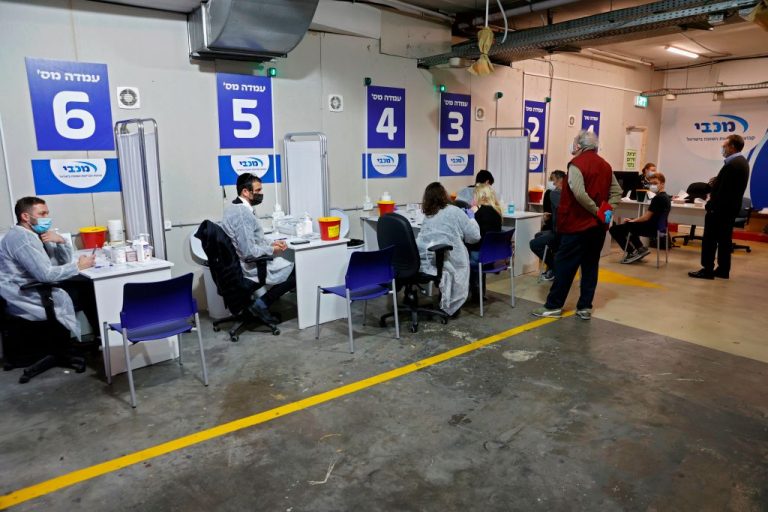A preprint study from Israel examining an extensive amount of the country’s medical data has found that natural exposure to SARS-CoV-2, the virus which causes Coronavirus Disease 2019 (COVID-19), provides significantly greater immunity to the virus than Pfizer-BioNTech’s vaccine.
Researchers from Israel’s Maccabi Healthcare Services, Samson Assuta Ashdod University Hospital, and Tel Aviv University used a retrospective cohort examination of an extensive centralized database of case data from Maccabi Health Services (MHS), which they described as “Israel’s second largest Health Maintenance Organization.”
The study notes the MHS is one of the country’s four national health funds (all citizens must join one of the four), has 2.5 million members, and amounts to 26 percent of the population.
The team examined “Anonymized Electronic Medical Records” from the MHS database between March 1, 2020 and Aug. 14, 2021 pertaining to COVID-19 in patients aged 16 or older, focusing on three groups:
- People who had received two doses of the Pfizer vaccine before Feb. 28, 2021, did not take the third booster injection by the end of the study period, and did not register a positive PCR test by June 1, 2021;
- People with a positive PCR test before Feb. 28, 2021 but who had not accepted any doses of vaccine before the end of the study period; and
- People with a positive PCR test before Feb. 28, 2021 who had also received a single dose of the Pfizer vaccine by May 25, 2021.
Researchers used the fully vaccinated group as their comparison/reference group and matched groups 2 and 3 to the comparison group on a 1:1 basis, adjusting for age, sex, socioeconomic status, and time of infection or vaccination.
Success
You are now signed up for our newsletter
Success
Check your email to complete sign up
This method produced three models based on 673,676 eligible MHS members, with 62,883 unvaccinated and previously infected individuals and 42,099 previously infected individuals who had taken a single dose of Pfizer’s vaccine.
Model 1 – previous infection v. vaccination + time matched events
In model one, the study compares “the likelihood of SARS-CoV-2-related outcomes between previously infected individuals who have never been vaccinated and fully vaccinated SARS-CoV-2-naïve individuals” with a time frame of vaccination receipt or registration of a positive PCR test between Jan. 1 and Feb. 28, 2021.
Researchers noted, “Overall, demographic characteristics were similar between the groups, with some differences in their comorbidity profile.”
Total Findings:
- 16,215 matches
- 257 SARS-CoV-2 positive PCR tests
- 238 breakthrough tests in the vaccinated group
- 19 tests in the previously infected group
- 199 SARS-CoV-2 symptomatic infections
- 191 symptomatic breakthroughs in the vaccinated group
- 8 symptomatic reinfections in the previously infected group
- 8 vaccinated group hospitalizations
- 1 previously infected group hospitalization
- 0 deaths
Adjusted for comorbidities, the vaccinated group was at 13.06 times greater risk of breakthrough than the previously infected was for reinfection, according to the study, which noted, “Apart from age ≥60 years, there was no statistical evidence that any of the assessed comorbidities significantly affected the risk of an infection during the follow-up period.”
The study used a 5-day time frame to detect symptoms after a positive PCR test, which they said included, “Chiefly fever, cough, breathing difficulties, diarrhea, loss of taste or smell, myalgia, weakness, headache and sore throat.”
In terms of risk of symptomatic breakthrough or reinfection, adjusting for comorbidities, the study found a 27.02 times greater risk in the vaccinated group than the previously infected group.
Model 2 – previous infection v. vaccination – no time matching
The second model compared the fully vaccinated group against those who had registered a positive PCR test at any time before Feb. 28, 2021, including in 2020.
Total Findings:
- 46,035 matches
- 748 SARS-CoV-2 positive PCR tests
- 640 breakthrough tests in the vaccinated group
- 108 reinfected tests in the previously infected group
- 552 SARS-CoV-2 symptomatic infections
- 484 symptomatic breakthroughs in the vaccinated group
- 68 symptomatic reinfections in the previously infected group
- 21 vaccinated group hospitalizations
- 4 previously infected group hospitalizations
- 0 deaths
In this data set, researchers found the vaccinated group was at 5.96 times greater risk of positive test and 7.13 times greater risk of symptomatic infection.
Researchers noted, “There was no statistical evidence that any of the comorbidities significantly affected the risk of an infection,” and that, “Being 60 years of age or older significantly increased the risk of COVID-19-related hospitalizations.”
Model 3 – previous infection v. previous infection + single dose vaccination
This data set compared the previously infected group against the group which had registered a previous infection, but also received a single dose of the Pfizer vaccine. This data set found the group who had taken an additional injection fared slightly better than natural immunity:
Total Findings:
- 14,029 matches
- 57 SARS-CoV-2 positive PCR tests
- 37 reinfected tests in the previously infected group
- 20 reinfected tests in the previously infected and vaccinated group
- 39 SARS-CoV-2 symptomatic infections
- 23 symptomatic reinfections in the previously infected group
- 16 symptomatic reinfections in the previously infected and vaccinated group
- 1 previously infected group hospitalization
- 0 previously infected and vaccinated group hospitalization
- 0 deaths
Researchers found the previously infected group who also took one dose of the Pfizer vaccine was 0.53 times less likely to be reinfected than the previously infected group.
“Though this finding corresponds to previous reports,” the study noted in the Discussion section, “we could not demonstrate significance in our cohort.”
It added, “We conducted a further sub-analysis, compelling the single-dose vaccine to be administered after [emphasis inherent] the positive RT-PCR test. This subset represented 81% of the previously-infected-and-vaccinated study group. When performing this analysis, we found a similar, though not significant, trend of decreased risk of reinfection…”
Conclusions and limitations
“The advantageous protection afforded by natural immunity that this analysis demonstrates could be explained by the more extensive immune response to the SARS-CoV-2 proteins than that generated by the anti-spike protein immune activation conferred by the vaccine.”
Researchers put a caveat on the statement, “However, as a correlate of protection is yet to be proven, including the role of B-Cell and T-cell immunity, this remains a hypothesis.”
For limitations of the study, the scientists say, “First, as the Delta variant was the dominant strain in Israel during the outcome period, the decreased long-term protection of the vaccine compared to that afforded by previous infection cannot be ascertained against other strains.”
It also reemphasizes that the study only focused on the Pfizer-BioNTech vaccine and did not account for effects of a third dose booster injection. Israel also distributes the Moderna mRNA vaccine as its second option.
“Additionally, as this is an observational real-world study, where PCR screening was not performed by protocol, we might be underestimating asymptomatic infections, as these individuals often do not get tested.”
“Lastly, although we controlled for age, sex, and region of residence, our results might be affected by differences between the groups in terms of health behaviors (such as social distancing and mask wearing), a possible confounder that was not assessed.”
“As individuals with chronic illness were primarily vaccinated between December and February, confounding by indication needs to be considered; however, adjusting for obesity, cardiovascular disease, diabetes, hypertension, chronic kidney disease, chronic obstructive pulmonary disease, cancer and immunosuppression had only a small impact on the estimate of effect as compared to the unadjusted OR. Therefore, residual confounding by unmeasured factors is unlikely.”
On Sept. 12, Israel Health Minister Nitzan Horowitz was caught on a hot mic by Channel 12 television speaking to Interior Minister Ayelet Shaked before a cabinet meeting, where he not only admitted the purpose of the Green Pass vaccine passport is to pressure the unvaccinated into accepting an injection, but blamed the unvaccinated for “overloading the hospitals.”

















